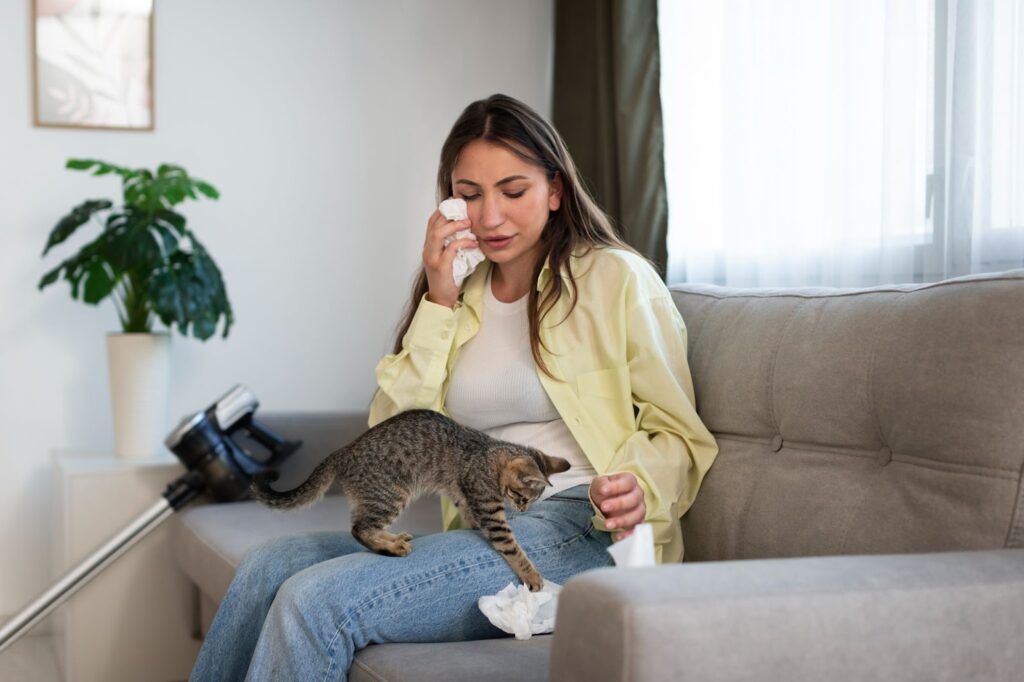4 Vet Recommended Natural Remedies for Cat Allergy Relief

Cat allergy can be a real nuisance for many people, causing uncomfortable symptoms that make it difficult to enjoy the company of these adorable creatures. But fear not, because we will explore natural remedies and strategies that can help provide much-needed relief from cat allergies.
Understanding Cat Allergy
Cat allergies occur when your immune system reacts negatively to proteins found in a cat’s skin cells, saliva, or urine. These proteins are known as allergens and can trigger allergic reactions in sensitive individuals.
When you come into contact with these allergens, your body releases histamines, which are chemicals that cause common allergy symptoms such as sneezing, itching, watery eyes, and congestion. It’s important to note that the severity of cat allergies can vary from person to person.
Interestingly enough, it’s not actually the fur itself that causes most cat allergies but rather the dander – tiny flakes of dead skin – that cats shed regularly. This dander can become airborne and settle on furniture, carpets, and clothing.
It’s worth mentioning that even if you’ve never had an allergic reaction to cats before, it doesn’t necessarily mean you won’t develop them later on. Allergies can develop at any age due to changes in your immune system or prolonged exposure to allergens.
Common Symptoms of Cat Allergy
Cat allergies can manifest in various ways, and it’s important to be aware of the common symptoms. While some individuals may experience mild reactions, others may have more severe symptoms. Here are some key signs to watch out for if you suspect you or someone you know has a cat allergy.
Sneezing:
If you find yourself constantly reaching for tissues whenever a cat is around, it could be an indication of an allergic reaction. Another telltale sign is itching and redness in the eyes, often accompanied by watery discharge.
Nasal congestion and runny nose:
You might notice that your nose feels stuffy or that there is a constant drip. Some people may even develop hives or rashes on their skin after coming into contact with cats.
Asthma-like symptoms:
Wheezing and difficulty breathing – these symptoms should not be taken lightly and require immediate medical attention.
It’s important to remember that these symptoms can vary from person to person, so it’s essential to pay attention to how your body reacts when exposed to cats.
Natural Remedies for Cat Allergy Relief
Are you tired of sneezing, itching, and wheezing every time you’re around cats? If so, you may be suffering from cat allergies. But don’t worry – there are natural remedies that can help provide relief from these bothersome symptoms.
1- Saline nasal rinses:
These rinses can help flush out allergens from your nasal passages and reduce congestion. Simply mix a teaspoon of salt with distilled water and use a neti pot or squeeze bottle to rinse your sinuses.
2- Anti-inflammatory foods:
Foods like turmeric, ginger, and garlic have powerful anti-inflammatory properties that can help alleviate allergic reactions. You can add these ingredients to your meals or take them in supplement form.
3- Herbal remedies:
Butterbur and stinging nettle may also provide relief from cat allergies. These herbs have been used for centuries for their antihistamine effects and can be taken in capsule or tea form.
4- Clean Home:
Regularly vacuuming carpets and upholstery will remove pet dander that triggers allergic reactions. Additionally, using allergen-proof covers on mattresses and pillows can help create a barrier between you and the allergens.
By incorporating these natural remedies into your routine, you may find some much-needed relief from the symptoms of cat allergies without relying solely on medication!

Managing Your Home Environment for a Less Cat Allergic Reaction
When it comes to managing cat allergies, creating a low-allergen home environment is crucial for reducing allergic reactions. Here are some tips on how to make your home more allergy-friendly.
- Designate certain areas of your home as off-limits to your furry friend. This can be especially helpful if you have a bedroom or other areas where you spend a significant amount of time. Keeping these spaces free from pet dander and allergens can provide you with a safe haven when symptoms flare up.
- Regular cleaning is key in maintaining a low-allergen environment. Vacuuming carpets and upholstery frequently helps remove pet hair and dander that may trigger allergies. Using high-efficiency particulate air (HEPA) filters in vacuum cleaners can also help trap smaller particles effectively.
- Investing in hypoallergenic bedding and pillow covers can create an additional barrier against allergens while you sleep. These specially designed covers prevent dust mites, pollen, and pet dander from settling into your bedding, providing relief throughout the night.
- Washing your hands after interacting with cats is essential to remove any allergens that may cling to your skin. Additionally, bathing cats regularly can help reduce the amount of allergens they produce by washing away loose fur and dander.
- Consider improving indoor air quality by using air purifiers equipped with HEPA filters. These devices can help remove airborne allergens such as pet dander, pollen, mold spores, and dust mites from circulating within your living space.
It’s important to remember that everyone’s body reacts differently to allergens, so what works for one person may not work for another. It may take some trial and error to find the right combination of remedies that work best for you. Consulting with a healthcare professional or allergist is also recommended if you have severe allergic reactions or if your symptoms persist despite trying these natural remedies.
Remember, prevention is key when it comes to managing cat allergies. Taking steps such as keeping your home clean, using air purifiers, grooming your cat regularly, and creating designated “cat-free” zones in your home can greatly reduce exposure to allergens.
So don’t let cat allergies hold you back from experiencing all the joys that come with owning a pet! Explore these natural remedies and make adjustments in your environment to create an allergy-friendly space where both you and your feline friend can thrive together harmoniously.
Also Read: What You Need to Know About Cat Grooming in Dubai
If you loved this article, you will also love reading our eBook Dubai Ruff Guide
For more furry destinations, the latest blogs, events, and providers you can stay updated by following us on Instagram and signing up for our newsletters.

